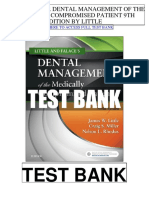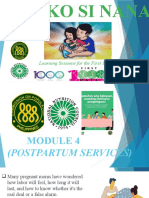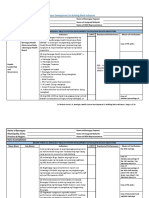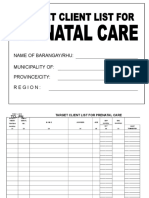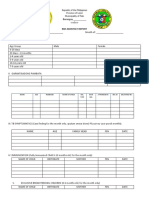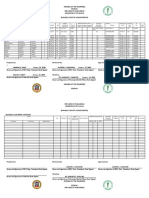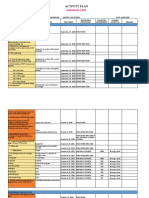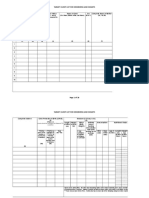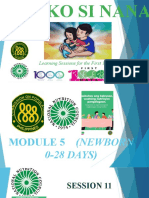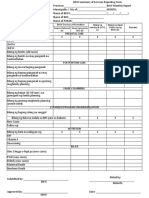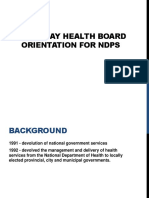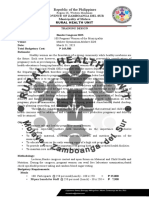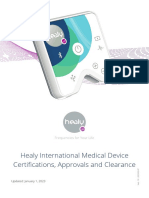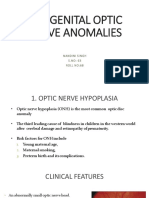100%(4)100% found this document useful (4 votes)
1K viewsNCD Risk Assessment Form
NCD Risk Assessment Form
Uploaded by
ruiza corcinoThis document contains a questionnaire to assess patients for probable angina, heart attack, stroke, or transient ischemic attack. It collects information on symptoms, risk factors, family history, lifestyle habits, and vital signs. If patients report chest pain or other symptoms when walking or exerting themselves, or prolonged chest pain, they may have angina or a heart attack and need to see a doctor. If they report symptoms of stroke like difficulty speaking or weakness on one side, they may have had a transient ischemic attack or stroke and need evaluation. The questionnaire also screens for diabetes and monitors blood pressure, blood glucose, blood lipids, and urine tests to further evaluate risk factors and guide management.
Copyright:
© All Rights Reserved
Available Formats
Download as DOCX, PDF, TXT or read online from Scribd
NCD Risk Assessment Form
NCD Risk Assessment Form
Uploaded by
ruiza corcino100%(4)100% found this document useful (4 votes)
1K views1 pageThis document contains a questionnaire to assess patients for probable angina, heart attack, stroke, or transient ischemic attack. It collects information on symptoms, risk factors, family history, lifestyle habits, and vital signs. If patients report chest pain or other symptoms when walking or exerting themselves, or prolonged chest pain, they may have angina or a heart attack and need to see a doctor. If they report symptoms of stroke like difficulty speaking or weakness on one side, they may have had a transient ischemic attack or stroke and need evaluation. The questionnaire also screens for diabetes and monitors blood pressure, blood glucose, blood lipids, and urine tests to further evaluate risk factors and guide management.
Copyright
© © All Rights Reserved
Available Formats
DOCX, PDF, TXT or read online from Scribd
Share this document
Did you find this document useful?
Is this content inappropriate?
This document contains a questionnaire to assess patients for probable angina, heart attack, stroke, or transient ischemic attack. It collects information on symptoms, risk factors, family history, lifestyle habits, and vital signs. If patients report chest pain or other symptoms when walking or exerting themselves, or prolonged chest pain, they may have angina or a heart attack and need to see a doctor. If they report symptoms of stroke like difficulty speaking or weakness on one side, they may have had a transient ischemic attack or stroke and need evaluation. The questionnaire also screens for diabetes and monitors blood pressure, blood glucose, blood lipids, and urine tests to further evaluate risk factors and guide management.
Copyright:
© All Rights Reserved
Available Formats
Download as DOCX, PDF, TXT or read online from Scribd
Download as docx, pdf, or txt
100%(4)100% found this document useful (4 votes)
1K views1 pageNCD Risk Assessment Form
NCD Risk Assessment Form
Uploaded by
ruiza corcinoThis document contains a questionnaire to assess patients for probable angina, heart attack, stroke, or transient ischemic attack. It collects information on symptoms, risk factors, family history, lifestyle habits, and vital signs. If patients report chest pain or other symptoms when walking or exerting themselves, or prolonged chest pain, they may have angina or a heart attack and need to see a doctor. If they report symptoms of stroke like difficulty speaking or weakness on one side, they may have had a transient ischemic attack or stroke and need evaluation. The questionnaire also screens for diabetes and monitors blood pressure, blood glucose, blood lipids, and urine tests to further evaluate risk factors and guide management.
Copyright:
© All Rights Reserved
Available Formats
Download as DOCX, PDF, TXT or read online from Scribd
Download as docx, pdf, or txt
You are on page 1of 1
Questionnaire to Determine Probable Angina, Heart Attack, Stroke or Transient Ischemic Attack
NCD HIGH- RISK ASSESSMENT
ID No. Angina or Heart Attack Yes No
( Community Case Finding Form) 1 Have you had any pain or discomfort or any preassure or heaviness in your chest? Nkakaramdam ka ba ng pananakit
o kabigatan sa iyong dibdib?
Date of Assessment: Birth Date: Age: Yes/Oo No/ Hindi
2 Do you get the pain in the center of the chest or left chest or left arm? Ang sakit ba ay nasa gitna ng dibdib, sa
Name: Civil Status: Sex: kaliwang bahagi ng dibdib o sa kaliwang braso?
S M D W M F Yes/Oo No/ Hindi
Address: Contact Numbers: 3 Do you get it when you walk uphill or in a hurry? Nararamdaman mo ba ito kung ikaw ay nagmamadali o naglalakad
nang mabilis o paakyat?
Yes/Oo No/ Hindi
Occupation: Educational Attainment: 4 Do you slowdown if you get the pain while walking? Tumitigil ka ba sa paglalakad kapag sumakit ang iyong dibdib?
Yes/Oo No/ Hindi
5 Does the pain go away if you stand still or if you take a tablet under the tongue? Nawawala ba ang sakit kapag ikaw
Smoking (Tobacco/ Cigarette)
ay di kumilos o kapag naglalagay ka ng gamot sa ilalim ng iyong dila?
Family History Yes/Oo No/ Hindi
Does patient have 1st degree Never smoked Stopped >a year 6 Does the pain go away in less than 10 minutes? Nawawala ba ang sakit sa loon ng 10 minuto?
relative with: Current smoker Stopped <a year Yes/Oo No/ Hindi
Passive smoker 7 Have you ever had a severe chest pain across the front of your chest lasting for half an hour or more? Nakakaramdam
Hypertension Yes No Alcohol intake ka na na ng pananakit ng dibdib na tumagal ng kalahating oras o higit pa?
Stroke Yes No Never consumed Yes, drinks alcohol Yes/Oo No/ Hindi
Heart Attack Yes No If the answer to Questions 3 or 4 or 5 or 6 or 7 is YES, patient may have Angina or Heart Attack and needs to see
Diabetes Yes No Excessive Alcohol Intake the doctor.
Asthma Yes No In the past month, had 5 drinks in one occasion. Stroke and TIA
Cancel Yes No Yes No 8 Have you ever had any of the following: diffi culty in talking, weakness of arm and/or leg on one side of the body or
numbness on one side of the body? Nkakaramdam ka na ba ng mga sumusunod: hirap sa pagsasalita, panghihina
Kidney Disease Yes No High Fat/High Salt Food Intake
ng braso at/o ng binti o pamamanhid sa kalahating bahagi ng katawan? Yes No
Eats proccessed/ fast foods (e.g. instant
Presence or absence of Diabetes noodles, hamburgers, fries, fried chicken skin, If the answer to Question 8 is Yes, the patient may have has a TIA or stroke and needs to see the doctor.
Was patient diagnosed as etc.) and ihaw ihaw (e.g. isaw, adidas, etc.) Presence or absence of Diabetes Raised Blood Glucose Yes No
having diabetes? weekly Yes No 1. Was the patient diagnosed as having diabetes? FBS / RBS Date
Datetaken:
taken___________
: _______
Yes No Do not know Dietary Fiber Intake: Yes No If YES, perform Urine Test for Ketones
Central Adiposity 3 servings of vegetables daily Yes No with medications without medications
Yes No 2-3 servings of fruits daily Yes No and perform Urine Test for Ketones. Raised Blood Lipids
Waist circumference (cm) Physical Activity If No or Do not Know, proceed to question 2 Total Cholesterol Date taken: ________
Does at least 2 1/2 hours a week of 2. Does patient have the following symptoms?
Raised BP moderate intensity physical activity Polyphagia Yes No Presence of Urine Ketones
Yes No Polydipsia Yes No Urine Ketone Date taken:___________
Polyuria Yes No
Systolic 1st reading Action:
Presence of Urine Protein
Diastolic 1st reading Referred to health center
If two or more of the above symptoms are present, Urine Protein Date taken: __________
Systolic 2nd reading Date & Time: ________________
perform a blood glucose test.
Diastolic 2nd reading Given Health Information
Management: Lifestyle Modification Medications Follow-up: _____________
Average Blood Preassure Assessment done by: ___________________ __________________________________________________________________________________________________
Printed Name & Signature __________________________________________________________________________________________________
__________________________________________________________________________________________________
Risk Level: <10% 10% to <20% 20% to <30% >30%
Findings: __________________________________________________________________
You might also like
- BHW Reference ManualDocument116 pagesBHW Reference ManualGa B B Orlongan80% (5)
- Philpen Risk Assessment Form Revised 2022Document3 pagesPhilpen Risk Assessment Form Revised 2022Jay Arr Oro90% (10)
- PhilPEN Plus Risk Assessment FormDocument2 pagesPhilPEN Plus Risk Assessment FormRhu Salay86% (7)
- Dental Management Medically Compromised Patient 9th Little Test BankDocument5 pagesDental Management Medically Compromised Patient 9th Little Test BankSaifoqq100% (1)
- Id No.: CVD/NCD Assessment Form For Adults 20 Years Old and AboveDocument1 pageId No.: CVD/NCD Assessment Form For Adults 20 Years Old and AboveNel Jerez83% (6)
- Nina Tool Revised 2017Document3 pagesNina Tool Revised 2017thonjustine100% (4)
- Dengue Hemorrhagic Fever PathophysiologyDocument4 pagesDengue Hemorrhagic Fever Pathophysiologyteddydeclines1483% (18)
- Family Planning Service Record Form IDocument4 pagesFamily Planning Service Record Form IBarangay Lam-anNo ratings yet
- CVD NCD Risk Assessment FormDocument2 pagesCVD NCD Risk Assessment Formsmoothp3ak100% (1)
- BHW Reference Manual and Playbook - TagalogDocument136 pagesBHW Reference Manual and Playbook - TagalogCarlen Mae L. Yacapin100% (2)
- Risk Assessment FormDocument1 pageRisk Assessment Formncd.bulacanNo ratings yet
- Assessment, Evaluation and Refresher Activity For BHWsDocument83 pagesAssessment, Evaluation and Refresher Activity For BHWsMica ElaNo ratings yet
- HPN-DM Draft ResolutionDocument4 pagesHPN-DM Draft ResolutionRoselle Lim100% (4)
- 4 Idol Ko Si Nanay Module 4Document18 pages4 Idol Ko Si Nanay Module 4Mash JumahariNo ratings yet
- BHLMP Form1.B BlankDocument18 pagesBHLMP Form1.B BlankCHICKYNo ratings yet
- Essay Q's Obs and Gyn 2Document2 pagesEssay Q's Obs and Gyn 2whoosh200889% (9)
- M5 - TransferringDocument43 pagesM5 - Transferringruiza corcinoNo ratings yet
- 3 - Slide Deck - Health Promotion Playbook Orientation - March 16, 2021Document140 pages3 - Slide Deck - Health Promotion Playbook Orientation - March 16, 2021Arabella Catindoy100% (2)
- FHSIS Form TCL Pre NatalDocument11 pagesFHSIS Form TCL Pre NatalEden Vblagasy100% (5)
- BHW Monthly Report FormDocument3 pagesBHW Monthly Report FormPearlCarylCatantan-Cadavis80% (5)
- Target Client List For Nutrition and Expanded Program For ImmunizationDocument7 pagesTarget Client List For Nutrition and Expanded Program For ImmunizationEden Vblagasy0% (1)
- BHLMP Form 1.b. Barangay Health System Development Six Building Block IndicatorsDocument20 pagesBHLMP Form 1.b. Barangay Health System Development Six Building Block IndicatorsLouieNo ratings yet
- Implementing Guidelines For The Establishment of HPN and DM ClubDocument15 pagesImplementing Guidelines For The Establishment of HPN and DM ClubChristian Felix Ignacio100% (2)
- BHW Profile FormDocument13 pagesBHW Profile FormMarinaGalaragaAblaoPadoNo ratings yet
- Accomplishment Report Human Resource For Health (HRH) Deployment Program For The Month of - , 2021Document4 pagesAccomplishment Report Human Resource For Health (HRH) Deployment Program For The Month of - , 2021Ace Gaming100% (1)
- Basic Training For: Barangay Health Workers Barangay Nutrition ScholarDocument16 pagesBasic Training For: Barangay Health Workers Barangay Nutrition ScholarMario Hipolito100% (6)
- LGU Validation ToolDocument22 pagesLGU Validation ToolKirsten Calvo100% (4)
- Activity Plan: Barangay LapuDocument5 pagesActivity Plan: Barangay LapuInchic Miranda0% (1)
- R A 10152Document3 pagesR A 10152Cesar Valera100% (4)
- BHW Pocket HandbookDocument70 pagesBHW Pocket HandbookGa B B Orlongan100% (9)
- DOH Pregnancy Tracking FormDocument9 pagesDOH Pregnancy Tracking FormEden VblagasyNo ratings yet
- Approach To A Patient With Diarrhea Dr. Mohamed Abu HmaidDocument61 pagesApproach To A Patient With Diarrhea Dr. Mohamed Abu Hmaidoss-20502745No ratings yet
- FDARDocument5 pagesFDARKris TejereroNo ratings yet
- Local Health Board Minutes2Document2 pagesLocal Health Board Minutes2JAMIL ASUM50% (2)
- BHW Monthly Report FormDocument1 pageBHW Monthly Report FormMarj Apolinar100% (1)
- Child TCLDocument28 pagesChild TCLNandie JoyNo ratings yet
- 5 Idol Ko Si Nanay Module 5Document48 pages5 Idol Ko Si Nanay Module 5Mash Jumahari100% (1)
- Family Planning TCLDocument2 pagesFamily Planning TCLKristine TanNo ratings yet
- Hypertension and Diabetes ClubDocument15 pagesHypertension and Diabetes Clubncd.bulacanNo ratings yet
- (173412463) 173367410-HIV-Brochure-Tagalog-updated-9-25Document2 pages(173412463) 173367410-HIV-Brochure-Tagalog-updated-9-25raighnejames19No ratings yet
- EPI MIcroplanDocument8 pagesEPI MIcroplanjimelyquinones78100% (2)
- FP Form1 V3.0 2016Document3 pagesFP Form1 V3.0 2016Lorenz Joey Ricarte100% (2)
- Bhert Training PresentationDocument123 pagesBhert Training PresentationJanelle Matamorosa100% (1)
- BHW Summary of Services Reporting Form 1Document5 pagesBHW Summary of Services Reporting Form 1MOLINO II SOCIAL SERVICESNo ratings yet
- Afhf Level 2Document3 pagesAfhf Level 2ela bachii50% (2)
- Iec Safe MotherhoodDocument3 pagesIec Safe MotherhoodJomer Gonzales100% (1)
- BHW HandbookDocument70 pagesBHW Handbookjames paul murio100% (1)
- Buntis CongressDocument3 pagesBuntis CongressSaraJaneOmandam100% (1)
- BHB Orientation For NDPs-1Document19 pagesBHB Orientation For NDPs-1Shevan Simon AliñabonNo ratings yet
- LHB Comm. LetterDocument14 pagesLHB Comm. LetterBucloc Municipal Health OfficeNo ratings yet
- Advisory 3 With Amendment - MR OPV SIADocument1 pageAdvisory 3 With Amendment - MR OPV SIAD Alfz EinsTein JDNo ratings yet
- Microplanning For Manpower, Vaccines and Ancillary RequirementsDocument27 pagesMicroplanning For Manpower, Vaccines and Ancillary RequirementsArman BentainNo ratings yet
- 2023 Buntis Congress Training DesignDocument3 pages2023 Buntis Congress Training DesignBeverly Calma100% (7)
- Vital Signs (BHW Training) 2Document31 pagesVital Signs (BHW Training) 2Yathziel Meow100% (4)
- Adult Module 1 - Five Healthy Habits Powerpoint (Filipino)Document31 pagesAdult Module 1 - Five Healthy Habits Powerpoint (Filipino)Stephen100% (2)
- Brgy. Resolution For AdolescentDocument4 pagesBrgy. Resolution For AdolescentGina Salvador - GonzalesNo ratings yet
- BNS FormsDocument45 pagesBNS FormsOdiongan Kristian Jonh F.No ratings yet
- Unmet FormDocument2 pagesUnmet FormHan Nah Ju Deah100% (3)
- BHW SummitDocument4 pagesBHW Summitray ralf feril100% (1)
- Brgy Health Plan 2019Document18 pagesBrgy Health Plan 2019Napieh Bulalaque Polistico100% (1)
- LHB Resolution Budget PlanDocument2 pagesLHB Resolution Budget Planrhudelfinalbano100% (2)
- Action Plan Edited2Document3 pagesAction Plan Edited2Ardee Marius GuzmanNo ratings yet
- Narrative Report: Polio Outbreak Response Immunization Bopv Round 2Document4 pagesNarrative Report: Polio Outbreak Response Immunization Bopv Round 2Cristina MelloriaNo ratings yet
- Usapan Serye FormDocument1 pageUsapan Serye FormFret Ramirez Coronia RN100% (2)
- Facility Risk Assessment Form v.2Document1 pageFacility Risk Assessment Form v.2Errol Llanes100% (1)
- Revised-PhilPEN-12 28 18Document1 pageRevised-PhilPEN-12 28 18Kristine TanNo ratings yet
- Abtc FormsDocument11 pagesAbtc Formsruiza corcinoNo ratings yet
- Rabies ImmunizationDocument40 pagesRabies Immunizationruiza corcinoNo ratings yet
- UntitledDocument1 pageUntitledruiza corcinoNo ratings yet
- SCS2 ShockDocument13 pagesSCS2 Shockruiza corcinoNo ratings yet
- Steps in First Aid: Emergency Action Principle: Training Packages For Health EmergenciesDocument18 pagesSteps in First Aid: Emergency Action Principle: Training Packages For Health Emergenciesruiza corcino100% (1)
- Head and Neck Problems: Training Packages For Health EmergenciesDocument42 pagesHead and Neck Problems: Training Packages For Health Emergenciesruiza corcinoNo ratings yet
- Introduction To First Aid: Training Packages For Health EmergenciesDocument18 pagesIntroduction To First Aid: Training Packages For Health Emergenciesruiza corcinoNo ratings yet
- Drowning: Training Packages For Health EmergenciesDocument11 pagesDrowning: Training Packages For Health Emergenciesruiza corcinoNo ratings yet
- Long and Short VowelsDocument4 pagesLong and Short Vowelsruiza corcinoNo ratings yet
- SCS3 - Special EmergenciesDocument11 pagesSCS3 - Special Emergenciesruiza corcino100% (1)
- Guidance On The Application of InsecticideDocument9 pagesGuidance On The Application of Insecticideruiza corcinoNo ratings yet
- HAND, FOOT AND MOUTH DISEASE PPT Presentation - MRCPDocument16 pagesHAND, FOOT AND MOUTH DISEASE PPT Presentation - MRCPruiza corcinoNo ratings yet
- Nursing Care Plan For Peritonitis NCPDocument2 pagesNursing Care Plan For Peritonitis NCPderic86% (7)
- Lumbar-Facet-Injection PicDocument4 pagesLumbar-Facet-Injection PicBabu DhanarajNo ratings yet
- BELIZARIO VY Et Al Medical Parasitology in The Philippines 3e 158 226Document69 pagesBELIZARIO VY Et Al Medical Parasitology in The Philippines 3e 158 226Sharon Agor100% (1)
- Doner Selection: Criteria For Blood DonationDocument3 pagesDoner Selection: Criteria For Blood DonationyashramawatNo ratings yet
- Life Threatening Rhythm: Presenter: Muhammad Najmuddin Bin Hussain 2. Wan Muhammad Nasirudin Bin Wan YusoffDocument17 pagesLife Threatening Rhythm: Presenter: Muhammad Najmuddin Bin Hussain 2. Wan Muhammad Nasirudin Bin Wan YusoffWan NasirudinNo ratings yet
- Communicable Disease NursingDocument50 pagesCommunicable Disease NursingChernobyle Tolentino BattadNo ratings yet
- 1692 4803 1 PBDocument5 pages1692 4803 1 PBDinda DeliaNo ratings yet
- Healy World Certificate of Conformity en EUDocument38 pagesHealy World Certificate of Conformity en EUJOHANNA BJARNERNo ratings yet
- Case Study 5Document10 pagesCase Study 5josmamani6789No ratings yet
- Congenital Optic Nerve Anomalies: Nandini Singh S.NO: 63 Roll No:68Document54 pagesCongenital Optic Nerve Anomalies: Nandini Singh S.NO: 63 Roll No:68nandini singhNo ratings yet
- 2020-68 Annex B - Health Declaration Form110320Document4 pages2020-68 Annex B - Health Declaration Form110320Aileen MayaNo ratings yet
- IRC EngDocument89 pagesIRC EngMadalina SercaianuNo ratings yet
- 2016 American College of Rheumatology:European League Against Rheumatism Classification Criteria For Primary Sjögrens Syndrome 2017Document9 pages2016 American College of Rheumatology:European League Against Rheumatism Classification Criteria For Primary Sjögrens Syndrome 2017yokotoyNo ratings yet
- Introduction To Special Education: Taylor-White Elementary SchoolDocument23 pagesIntroduction To Special Education: Taylor-White Elementary SchoolEric D. ValleNo ratings yet
- Honorary Senior Clinical Lecturer, University of Sheffield Consultant Gastroenterologist Barnsley Hospital NHS Foundation Trust, UKDocument43 pagesHonorary Senior Clinical Lecturer, University of Sheffield Consultant Gastroenterologist Barnsley Hospital NHS Foundation Trust, UKFadilla Putri AmalyaNo ratings yet
- Burkitt's LymphomaDocument22 pagesBurkitt's LymphomaClementNo ratings yet
- Bindegewebsmassage ArticleDocument2 pagesBindegewebsmassage ArticleJulen Pulpon PabonNo ratings yet
- Henoch Scholein PurpuraDocument15 pagesHenoch Scholein PurpurapkpowerhouseNo ratings yet
- Ayurveda For Obesity - VikaspediaDocument2 pagesAyurveda For Obesity - VikaspediaKRISHNo ratings yet
- Guia 1 Should Shouldn't 3tDocument1 pageGuia 1 Should Shouldn't 3tSergio MojicaNo ratings yet
- The Wire: COVID-19: Centre Asks People To Wear Masks at Home As WellDocument2 pagesThe Wire: COVID-19: Centre Asks People To Wear Masks at Home As Well69 Rohit MaliNo ratings yet
- Y4 CBL4 Student Sheet Substance MisuseDocument3 pagesY4 CBL4 Student Sheet Substance Misusecasapu.irinaNo ratings yet
- First Aid - NotesDocument10 pagesFirst Aid - NotesRoisin McdonnellNo ratings yet
- Adams-Stokes 1º Sintoma Febre ReumáticaDocument5 pagesAdams-Stokes 1º Sintoma Febre Reumáticacarvalho.tr4270No ratings yet
- Management of Chest Trauma: Corinna Ludwig, Aris KoryllosDocument6 pagesManagement of Chest Trauma: Corinna Ludwig, Aris KoryllosAnonymous G9gfz4No ratings yet



